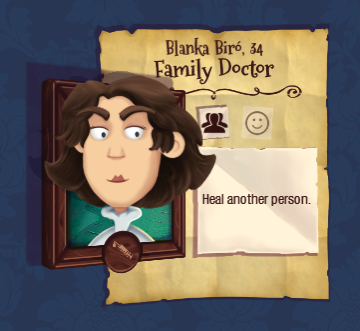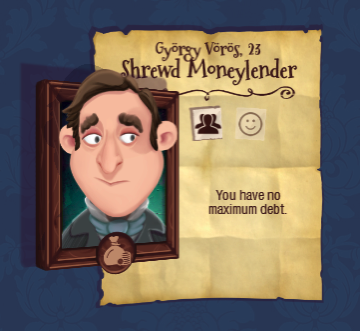You’ve read the Lasting Legacy announcement, seen some of the art, got an idea about the setting for the game, and you even know about the feelings we want players to experience. But what kind of game is Lasting Legacy exactly?
Lasting Legacy is a fairly unique game, so it doesn’t quite fit in any predetermined genre. The closest category would be single-player, turn-based simulation, although the simulation part in Lasting Legacy is very light (unlike something like Sim City or The Sims), and in that respect it’s more like a board game. So it’s more accurate to say that Lasting Legacy is a blend of simulation games and board games.
Intrigued? You’re in the right place. Read on.
What Do You Do in Lasting Legacy?
The description of the game says that you manage a family for about 200 years and build a lasting legacy. Every action you perform moves the time forward one year, and actions are performed directly on individual people.
There are some common, general actions available:
- Socialize, which helps you find more friends.
- Visit a friend, to increase that friendship.
- Propose in marriage or accept a marriage proposal.
- Pick an occupation for someone who recently became an adult.
Those actions allow you to tend to the family and continue growing the family tree. The meat of the game comes from each person having an occupation, and that occupation provides either a special action, or an ongoing effect.
For example, having a Doctor in the family gives you an action to heal a sick person.

On the other hand, a Moneylender in the family gives you the ongoing effect of not having maximum debt anymore (time to run those credit cards!).

The ultimate goal of the game is to achieve the highest legacy possible each time you play. You gain legacy in one of two ways:
- By acquiring heirlooms from deceased family members that give you legacy for different reasons (for example, number of people in your family with a particular occupation).
- By meeting the whims of some important family members. For example, someone in the family might have a thing for big weddings, so you’ll gain legacy for every big wedding you have while they’re around.
Sounds simple enough, but in order to do those things, you’ll have to balance the maintenance of your family (social needs, marriages, children, sickness), acquiring gold and prestige, and, to top it all, dealing with the rising military tension in your country. War is inevitable, but you may be able to deflate military tension and push off the start of the war (which brings the end of the game).
Game Mechanics
Stepping back and looking at the game from a high-level point of view, there are two major mechanics that appear:
- Tableau building. The family tree is your tableau, because it represents the powers and actions that are available to you. A lot of card games have a similar mechanic (Race for the Galaxy is one of the best and most famous ones), but in Lasting Legacy the tableau has a twist: It’s dynamic. People can only make a contribution while they’re alive, so your tableau will change as decades go by, and you’ll have to adapt your strategy and plan ahead to take full advantage of it.
- Hand management. Your friends are a very similar resource to a hand of cards in most games. You may be able to bring them into play as part of your family, or maybe you can do their action once and discard them. This hand of cards is also very dynamic and it changes with the friendship levels and your family prestige.
Those two mechanics are very common in card and board games. That’s not surprising since Lasting Legacy has strong board game influences. However, Lasting Legacy is not a board game, and it would be very difficult to make a straight translation into a physical game. There’s a light simulation under the hood that makes people do things by themselves: have children, propose in marriage, pick occupations (unless you pick them for them), etc. Hopefully it’s a good blend borrowing the best of both the digital and the physical worlds.
Want to find out more about Lasting Legacy as we announce it? Make sure you sign up for our mailing list and/or join the Facebook page.